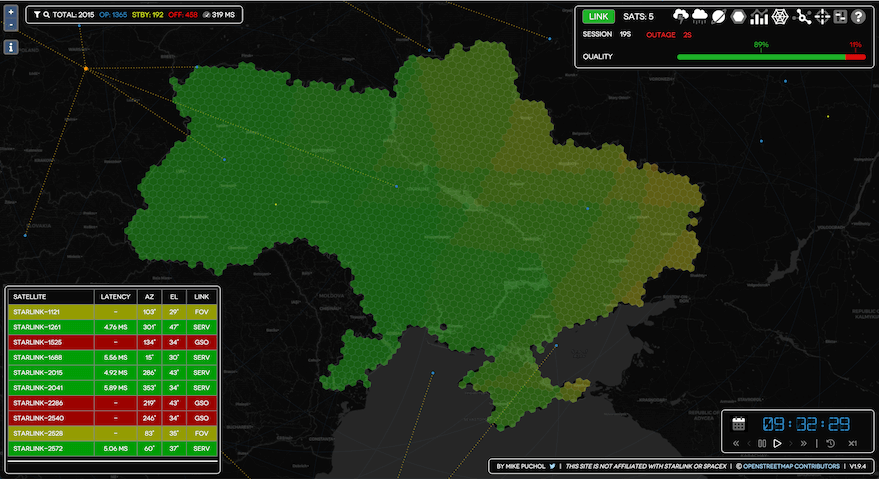WASHINGTON — Citing Starlink jamming “near conflict areas,” Elon Musk said March 5 that SpaceX will be “reprioritzed to cyber defense & overcoming signal jamming” at the expense of “slight delays” in Starship and Starlink V2.
In a series of overnight tweets, Musk, founder and chief executive of SpaceX, said the company was shifting its resources in response to jamming of terminals, presumably in Ukraine. A recent update to Starlink software “bypasses the jamming,” he added, but did not elaborate.
SpaceX reprioritized to cyber defense & overcoming signal jamming.
Will cause slight delays in Starship & Starlink V2.
— Elon Musk (@elonmusk) March 5, 2022
Some Starlink terminals near conflict areas were being jammed for several hours at a time. Our latest software update bypasses the jamming.
Am curious to see what’s next!
— Elon Musk (@elonmusk) March 5, 2022
The moves come a week after Musk responded to a request by Ukrainian Vice Prime Minister Mykhailo Fedorov, the country’s minister of digital transformation, to provide Starlink service in the country to ensure access if Russia cut off other lines of communications. Musk said Feb. 26 that Starlink service has been turned on in the country and, two days later, an initial shipment of at least several dozen Starlink terminals arrived in Ukraine.
Neither SpaceX nor Ukrainian government officials have disclosed how many Starlink terminals are active in the country. Musk tweeted March 3 that SpaceX made other software changes to reduce the terminal’s power consumption, allowing it to be powered by a cigarette lighter in a car, and to enable roaming on moving vehicles.
Updating software to reduce peak power consumption, so Starlink can be powered from car cigarette lighter.
Mobile roaming enabled, so phased array antenna can maintain signal while on moving vehicle.
— Elon Musk (@elonmusk) March 3, 2022
Musk also claimed that Starlink “is the only non-Russian communications system still working in some parts of Ukraine, so probability of being targeted is high. Please use with caution.” While some experts have warned that Starlink terminals could be targeted by Russian forces, it’s unclear if they have. Moreover, in much of Ukraine terrestrial mobile connectivity remains working, as have satellite services such as Inmarsat and Iridium.
Important warning: Starlink is the only non-Russian communications system still working in some parts of Ukraine, so probability of being targeted is high. Please use with caution.
— Elon Musk (@elonmusk) March 3, 2022
However, Viasat’s KA-SAT broadband geostationary satellite, which provides service to Ukraine and other parts of Europe, has suffered service disruptions since the invasion started Feb. 24, which the company has blamed on a “cyber event.”
The focus on cybersecurity and anti-jamming upgrades comes at the expense of other company initiatives. “SpaceX reprioritized to cyber defense & overcoming signal jamming. Will cause slight delays in Starship & Starlink V2,” Musk wrote. He did not elaborate on the nature of the delays.
Starlink V2 is the second generation of the Starlink service, with its satellites designed to be launched on Starship vehicles. SpaceX has released few details about the capabilities of those satellites. SpaceX has been developing Starship vehicles at its Boca Chica, Texas, test site called Starbase, but cannot attempt an orbital launch of the vehicle until it received a license from the Federal Aviation Administration. That license, in turns, depends on the completion of an environmental assessment the FAA says will be done March 28, a date that has already slipped twice.
That shift in resources, though, does not appear to affect other SpaceX initiatives, including launching additional current-generation Starlink satellites. SpaceX launched a set of 47 Starlink satellites March 3 from the Kennedy Space Center, the third such launch in the last two weeks. Another Falcon 9 launch of Starlink satellites is scheduled for no earlier than March 8 from Cape Canaveral Space Force Station.
Musk also said that Starlink would not block Russian news sources from its network “unless at gunpoint.” The European Union has sought to block Russian state-controlled broadcasters, such as Russia Today and Sputnik, from operating in its countries. That ban extends to internet service providers as well as cable and satellite television companies.
Starlink has been told by some governments (not Ukraine) to block Russian news sources. We will not do so unless at gunpoint.
Sorry to be a free speech absolutist.
— Elon Musk (@elonmusk) March 5, 2022

